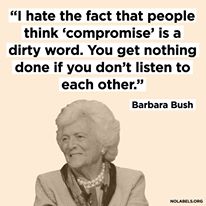Several years ago my husband took an elderly parishioner out for lunch at a diner. Since the man was unsteady on his feet, Les left him in the booth while he paid the bill. From across the diner Les heard the man exclaim loudly, “Boy, did you get fat!” As Les turned he saw the red-faced waitress who was the object of the elderly man’s observation.
We laugh when the elderly—or young children—speak their minds like this (at least if we’re not the waitress). But we also recognize that we don’t want this brazen honesty to be the rule in our world.
Except, thanks in part to this presidential election cycle, it seems it is.
In some leaked something-or-other, Hillary Clinton was quoted as saying you need “both a public and private position” on policy issues. She was vilified for it. But if we look at our own lives, first of all, we often have public and private positions on civility.
For instance, hopefully I’m never going to tell someone in public how fat they’ve gotten. But just the other week at home, I said to my husband, “It looks like ____ has gained a lot of weight.” That’s my private position, but I believe enough in civility that I wouldn’t say it in public. Because it’s rude. Because it hurts someone. Because it serves no purpose but to wound. Because I certainly wouldn’t want someone to say it to me.
 I don’t want bold-faced honesty in my relationships. (For instance, I don’t really want Les to be honest if I ask, “Do I look fat in this dress?” when I’m already wearing it.)
I don’t want bold-faced honesty in my relationships. (For instance, I don’t really want Les to be honest if I ask, “Do I look fat in this dress?” when I’m already wearing it.)
I don’t want no-holds-barred honesty in my church. (Would our corporate worship be enhanced if I stood up in worship and said, “I hate this song!” or simply crossed my arms, shut my mouth and put my stinky face on, while looking around the congregation?)
And I don’t want brash, brazen honesty in my coffee shop, my Facebook newsfeed, or my politics, either. I want civility. I want people to keep their private thoughts to themselves if those thoughts will demean or hurt or accuse others of being unspiritual.
We should also recognize that having both a public and private position affects our every relationship, and we negotiate it through compromise. It’s part of our lives every day in our families (unless you live with a dictatorial spouse).
As your family decides on a vacation, for instance, your private position might be that the beach is best. Your spouse’s might be that nothing beats the mountains. And the kids might be all for Disney. You may or may not express that private position. In most cases you will, but if you recognize how much your spouse wants or needs that mountain trip, you may choose to keep your desire to yourself so they don’t think they’re disappointing you.
If you all do express your private positions, you then work out a compromise. If you refuse to compromise, you’re not going anywhere, or at least not happily. (Anyone whose ever taken a sullen teenager on a vacation they didn’t choose and refused to embrace knows how much that can ruin life.) Once you reach a decision together, you all go along with it, doing your best to enjoy it. 
We expect the same thing on our church boards and at work. Everyone may have the right to civilly express their opinion. But once the group has made a decision (which often involves compromise—in the intensity or speed or severity of the change), we expect everyone to be a team player, to embrace it as “our” decision, “our” path forward. We make it our “public position,” and our private one remains unspoken in the future.
It’s how we do life successfully. We compromise. Compromise is not a dirty word. And yet it’s become that in politics. I don’t understand. Our founders set up our country to require compromise in government.
We and our elected leaders can have positions, strong positions. But at some point, if our nation is to move forward, we must know how to compromise. We must work together to solve problems and ensure our well-being.
 The compromise will likely mean the same things it does for a church board—we don’t get the change we privately want to the intensity we want it or at the speed we want it or to the degree we want it. But we will be moving forward rather than sitting across the aisle—or on the airwaves—screaming at each other while doing nothing. The need for compromise in Washington to make our country work drew me to the No Labels organization. I want problem-solvers in Washington.
The compromise will likely mean the same things it does for a church board—we don’t get the change we privately want to the intensity we want it or at the speed we want it or to the degree we want it. But we will be moving forward rather than sitting across the aisle—or on the airwaves—screaming at each other while doing nothing. The need for compromise in Washington to make our country work drew me to the No Labels organization. I want problem-solvers in Washington.
Years ago, someone told me, “Opinions are like armpits: We all have them and they all stink.” Maybe they don’t all stink, but we all have some that do stink and shouldn’t be expressed publicly. We all have some that need to be moderated and compromised on in order to live successfully in our homes and churches and work and country with people who are not us (which is everyone but me).
So I’m okay with private and public positions. I want civility back online and in person. I want compromise so we move forward together—at home, at church and in government.
It’s far better than shouting each other down while getting nowhere.